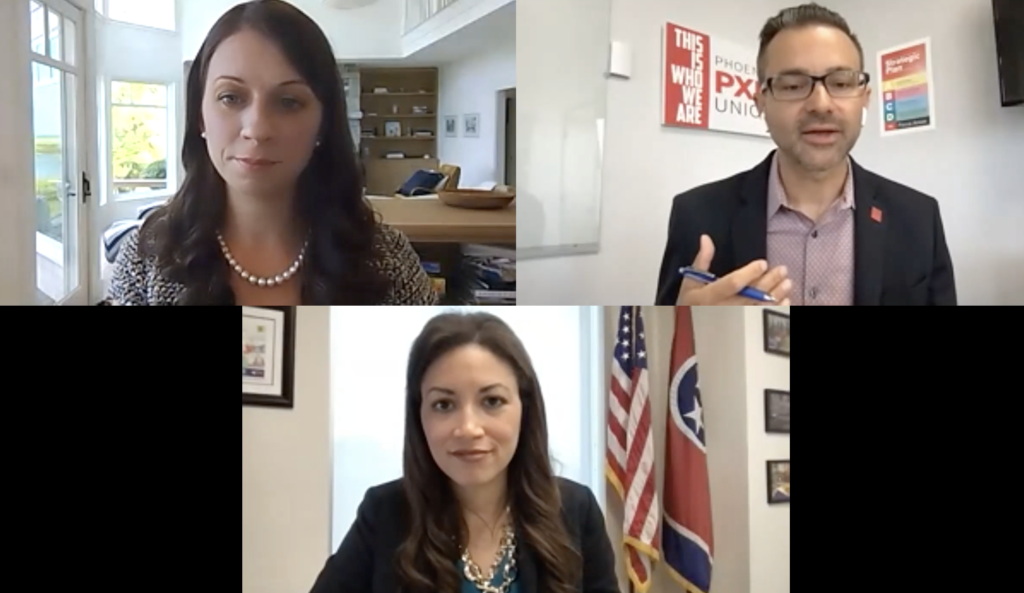We knew we wanted to showcase parent voices at Summit 2017, so we spent the previous eight months engaging parent networks. And when we planned the agenda, we put their stories center stage in our Lunch Plenary. This approach more than paid off – the powerful parent stories stole the show.
The session opened with a video about Shaylean Hester, a mother who is deeply passionate about her fifth-grade son, Ke’Anthony, and making sure he receives the best education possible. Ke’Anthony recently transferred to Valor Collegiate Academies, where the focus on social-emotional learning has helped him grow into a more engaged, passionate scholar. “Ke’Anthony loves it, every day he comes home and is so excited by what he’s learning,” Shaylean tells us about his switch to Valor.
The program then transitioned to a spotlight of parent stories on stage. First, we heard from Sipinga Fifita-Nau from RISE Colorado, who attended a presentation at her child’s school and heard about the 30-million-word gap, the current graduation rates, and the lack of quality education in her community. “This led me to take action on education in my community,” Sipinga told us. She organized a coalition with other parents to have a healthy conversation with the school board to improve academic achievement. This started other organizing campaigns, including a resolution passed just last night to keep schools safe and inclusive regardless of immigration status.
Next on the stage was Chapelle White from ACE of Nevada, whose daughter was yelled at for asking questions at school. Chapelle found out about Education Savings Accounts, which give children a right to other school options. Her daughter was so passionate about attending a new school that she wrote a letter to policy makers in Nevada, but the resolution didn’t pass. As a result, Chapelle made the difficult choice to send only one of her four children to private school. She explained, “Today children and parents are waiting for the Education Savings Account to be funded in our state, and we will continue to organize until great schools for our children are made possible.”
The third story spotlight came from Enrique Esparza from Innovate Public Schools, whose daughter had recently started kindergarten, but he felt the school had low expectations for his daughter and he was worried about her future. “I didn’t want her to end up working a minimum wage job,” Enrique said. “I asked friends and relatives for advice, but no one had the answer.” He then heard about a high-performing school nearby and wanted to bring it to their community, but he needed local support. With the help of Innovate Public Schools, he worked to engage the community. His strategy is to “knock doors, listen, and always carry a data report and let them know I’m the same parent as him.” He explained, “Data is so critical to wake people up to the reality of what is going on. Parents sometimes blame themselves for what is really a systemic problem, so data is critical to show they’re not alone.”
Matt Hammer, founder and CEO of Innovate Public Schools, then joined Sipinga, Chapelle and Enrique on stage with three more inspiring parents for a thought-provoking discussion on how getting involved in their communities’ education has changed their lives, and their advice to all of us in the audience to continue parent engagement.
Next we heard from Tiecha Ashcroft, also with ACE of Nevada. Tiecha’s eldest daughter was struggling in kindergarten, and by the second semester, her daughter was in danger of being held back. Tiecha asked for her daughter to be tested for an IEP, and she learned that her daughter would do best in a small group setting. However, the school wasn’t able to provide the small-group support her daughter needed, so Tiecha moved her into home school. “I found that Nevada lacked education choice so I decided to do something about it. I got together with a few other parents to create ACE of Nevada, and now we’ve grown to nearly 700 members.” She now organizes this passionate group of fellow parents to speak at community events in support of Education Savings Accounts to bring more choices for students like her daughter. “It just takes a few parents to stand up and say this isn’t working for us, and there are 700 other parents out there who are in the same boat. So the power of the people is tremendous if we exercise it.”
Diana Castro, also with RISE Colorado, came to the United States from Mexico when she was 15. She told us, “I never thought that the US had educational inequity.” She wasn’t getting enough resources to help her child learn at home and after speaking to the teachers and getting pushback, “I didn’t stop.” Diana persisted until she got a summer homework calendar, and then a year-round calendar, and now it’s a policy in the parent handbook. “That was our first win and that’s when I realized that we had power,” she said. “I never imagined I would be doing this type of work.”
Geraldine Anderson, also from Innovate Public Schools, has three sons and has worked with the San Francisco Superior Court for the last 28 years. “It was alarming to find out about the achievement gap with Latino and black students in San Francisco.” She told us about her work with the court, seeing the same faces that schools are failing being failed by the courts as well. “I was told that my son is meeting what he needs to meet according to his school’s standards, but that may not be good enough to make it to the college level. So, I chose to be involved to create parent power and get other parents on board to hopefully go to the legislature very soon.” She continued, “I want to take this experience [at Summit] back to my community, and I hope next year they’ll be sitting here where I’m sitting. We can make a movement happen with parent power.”
The parents then gave their advice directly to the audience:
- “Keep us in mind when you start to design this great school – parents want to be involved”
- “There has to be a relationship between teachers and parents. We are willing to help and we can make big changes”
- “It’s important to truly understand the value of parents – every parent has something to offer. They know their children best and if you push parents away, you don’t get to know the kids.”
Matt closed out the session with the powerful message that parent organizing isn’t just about elevating parent voices, but about creating lasting, impactful parent power. He challenged us to think about what each of us in the audience can do over the next year to engage parents in our roles, regardless of whether we’re a funder, entrepreneur or educator. At the next Summit, we can’t wait to hear how you’ve incorporated these parents’ powerful messages into your work.


